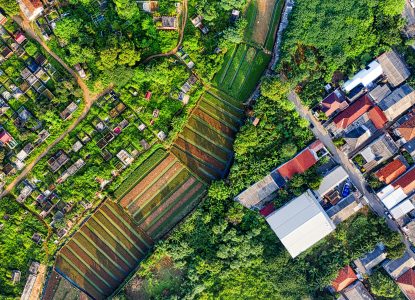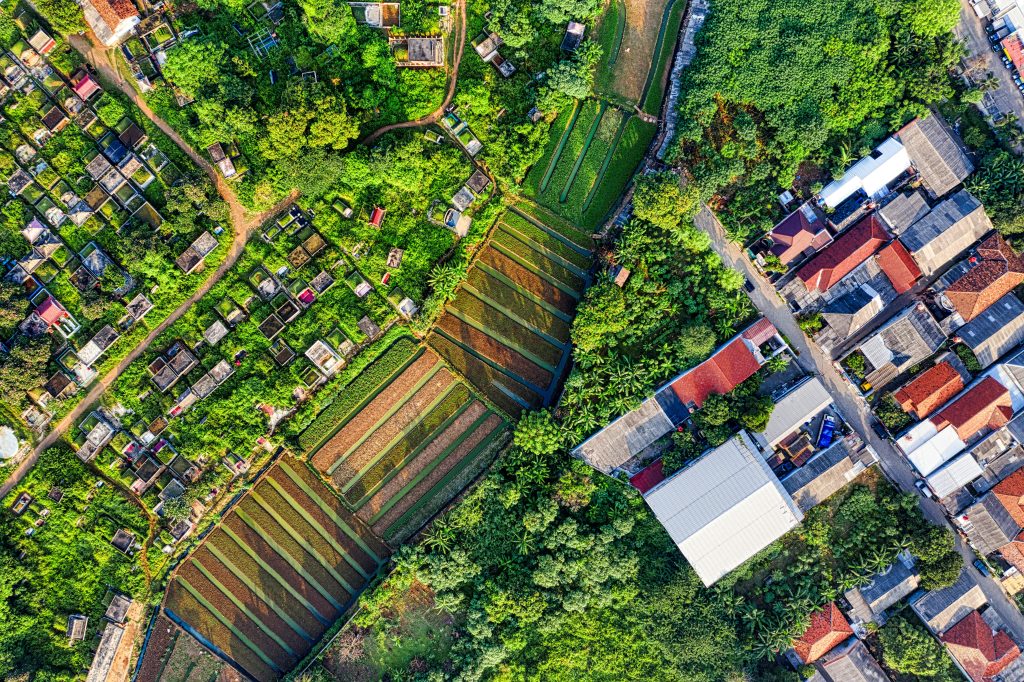By Arthur Lyon Dahl Ph.D. President of The International Environment Forum
The Intergovernmental Platform on Biodiversity and Ecosystem Services (IPBES) issued its Transformative Change Assessment in 2024 that makes science-based recommendations on how to transform society fundamentally to protect biodiversity and become sustainable. This compilation shows how this expert scientific view is completely compatible with Bahá’í principles. It follows the outline of the assessment’s Summary for Policymakers.
— —
Underlying Causes of Biodiversity Loss
The Disconnection from Nature
It has been widely acknowledged that economic prosperity has come at a tremendous cost to our natural environment. In fact, no country has emerged as a major industrial power without a legacy of significant environmental damage, affecting the security and well-being of its own populations and, equally significantly, those of developing nations. The growth-driven economic paradigm rooted in national interests at the expense of social and environmental variables and international well-being is under increasing scrutiny. (Bahá’í International Community, Eradicating Poverty: Moving Forward As One, 2008)
The Inequitable Concentration of Power and Wealth
Dogmatic materialism captured all significant centers of power and information at the global level, ensuring that no competing voices could challenge projects of world wide economic exploitation. (based on Universal House of Justice, One Common Faith, p. 3-4)
The welfare of any segment of humanity is inextricably bound up with the welfare of the whole. Humanity’s collective life suffers when any one group thinks of its own well-being in isolation from that of its neighbors’ or pursues economic gain without regard for how the natural environment, which provides sustenance for all, is affected. A stubborn obstruction, then, stands in the way of meaningful social progress: time and again, avarice and self-interest prevail at the expense of the common good. Unconscionable quantities of wealth are being amassed, and the instability this creates is made worse by how income and opportunity are spread so unevenly both between nations and within nations. (Universal House of Justice, To the Baha’is of the World, 1 March 2017)
The time has come when those who preach the dogmas of materialism, whether of the east or of the west, whether of capitalism or socialism, must give account of the moral stewardship they have presumed to exercise…. Why is the vast majority of the world’s peoples sinking ever deeper into hunger and wretchedness when wealth on a scale undreamed of by the Pharaohs, the Caesars, or even the imperialist powers of the nineteenth century is at the disposal of the present arbiters of human affairs? (Universal House of Justice, 1985, The Promise of World Peace, I, p. 7)
The Prioritization of Short-Term Individual and Material Gains
Materialism, rooted in the West, has now spread to every corner of the planet, breeding, in the name of a strong global economy and human welfare, a culture of consumerism. It skillfully and ingeniously promotes a habit of consumption that seeks to satisfy the basest and most selfish desires, while encouraging the expenditure of wealth so as to prolong and exacerbate social conflict. (Universal House of Justice, To Baha’is in the Cradle of the Faith, 2 April 2010)
Five Overarching Challenges to Transformative Change
1. Relations of Domination
The deepening environmental crisis, driven by a system that condones the pillage of natural resources to satisfy an insatiable thirst for more, suggests how entirely inadequate is the present conception of humanity’s relationship with nature…. The principle of the oneness of humankind implies, then, an organic change in the very structure of society. (Universal House of Justice, To the Baha’is of Iran, 2 March 2013, para. 6)
The elements and lower organisms are synchronized in the great plan of life. Shall man, infinitely above them in degree, be antagonistic and a destroyer of that perfection? (‘Abdu’l-Bahá, talk at Leland Stanford Junior University, Palo Alto, California, 8 October 1912. Promulgation of Universal Peace, p. 350)
2. Economic and Political Inequalities
One of the most pressing problems of humanity in the current century is how a growing, rapidly developing, and not yet united global population can, in a just manner, live in harmony with the planet and its finite resources…. The limited availability and inequitable distribution of resources profoundly impact social relations within and between nations in many ways, even to the point of precipitating upheaval and war [and] devastating consequences for the environment. The question of the impact of climate change… is today a major aspect of this larger problem. (Universal House of Justice, letter of 29 November 2017)
3. Inadequate Policies and Unfit Institutions
In general one can say that modern democracies have been established as the outcome of attempts to limit the power of absolute monarchy, of dictatorships, or of certain dominant classes. This may have come about gradually through the centuries, or tumultuously by a series of revolutions. Thus, even when democratic constitutions and structures have been established, there remains a suspicion of authority as such, and a tension between the degree of freedom accorded to individual citizens and the imposition of sufficient public discipline to protect the weak against the selfish pursuits of the strong among the citizenry. (Universal House of Justice, to an individual, 18 July 2000)
4. Unsustainable Consumption Patterns
Materialism’s gospel of human betterment produced today’s consumer culture pursuing ephemeral goals. For the small minority of people who can afford them, the benefits it offers are immediate, and the rationale unapologetic. The breakdown of traditional morality has led to the triumph of animal impulse, as instinctive and blind as appetite. Selfishness becomes a prized commercial resource; falsehood reinvents itself as public information; greed, lust, indolence, pride – even violence – acquire not merely broad acceptance but social and economic value. (based on Universal House of Justice, One Common Faith, 2005)
5. Limited Access to Clean Technologies
Innovation, much like the prevalent development paradigm, is deeply influenced by materialistic underpinnings. Basic notions about progress are largely founded on a belief that the acquisition of goods will conduce to greater levels of wellbeing. Solutions are devised based on these assumptions and widely transplanted without considering social, ethical, and spiritual implications. Even when resulting technologies benefit society in one way, they can have the effect of perpetuating existing disparities or undermine other social goals. (Baha’i International Community, Reflections of Our Values: Digital Technologies and a Just Transition, 2021)

Four Principles to Guide Deliberate Transformative Change
1. Equity and Justice
Take from this world only to the measure of your needs, and forego that which exceedeth them. Observe equity in all your judgements, and transgress not the bounds of justice, nor be of them that stray from its path. (Bahá’u’lláh, Súriy-i-Mulúk §19, in The Summons of the Lord of Hosts, p. 193)
Social justice will be attained only when every member of society enjoys a relative degree of material prosperity and gives due regard to the acquisition of spiritual qualities. The solution, then, to prevailing economic difficulties is to be sought as much in the application of spiritual principles as in the implementation of scientific methods and approaches. (Universal House of Justice, To Baha’is in the Cradle of the Faith, 2 April 2010)
Against the backdrop of climate change, environmental degradation, and the crippling extremes of wealth and poverty, the transformation from a culture of unfettered consumerism to a culture of sustainability has gained momentum…. …it is a transformation that will require an earnest examination of our understanding of human nature and of the cultural frameworks driving institutions of government, business, education, and media around the world. Questions of what is natural and just will need to be critically re-examined. The issue of sustainable consumption and production… will need to be considered in the broader context of an ailing social order—one characterized by competition, violence, conflict and insecurity—of which it is a part. (Bahá’í International Community, Rethinking Prosperity: Forging Alternatives to a Culture of Consumerism, 2010)
2. Pluralism and Inclusion
The community, a building block of the global arena, can provide a space where alternative, inclusive, and cooperative ways of life can find expression, where men wholeheartedly come to see women as equal partners, and all are empowered to develop leadership abilities…. Through moral educational programs, attitudes of unity and fellowship are instilled from a young age so that participants come to view each other as valued allies working for the well-being of their communities. Central to this process is the concept of capacity-building — of enhancing the ability of participants to better understand the material, social, and spiritual realities of their societies and to devise next steps as they collectively chart their own path of progress, deriving fulfilment through service. (Bahá’í International Community, The Heart of Resilience: The Climate Crisis as a Catalyst for a Culture of Equality, 2022)
3. Respectful Human-Nature Relationships
We cannot segregate the human heart from the environment outside us and say that once one of these is reformed everything will be improved. Man is organic with the world. His inner life moulds the environment and is itself also deeply affected by it. The one acts upon the other and every abiding change in the life of man is the result of these mutual reactions. (Letter written on behalf of Shoghi Effendi, 17 February 1933, Compilation on Social and Economic Development, p. 4)
Bahá’ís believe that the crucial need facing humanity is to find a unifying vision of the nature and purpose of human life. An understanding of humanity’s relationship to the natural environment is an integral part of this vision. (Bahá’í International Community, Seven Year Plan of Action on Climate Change, 2009)
4. Adaptive Learning and Action
To redefine progress is not to dismiss any legitimate accomplishments of the past, but to expand the boundaries of achievements yet to come. From new approaches to ownership and usership, to new forms of urban organization, to new methods of agriculture, power generation, and transportation, the possibilities before humanity are vast. Seizing them will require a far fuller expression of the stores of human potential latent within every individual and the combined efforts of humanity as a whole. But the coming decades hold the prospect of being an exceptionally rich and rewarding period of human history. Daunting as the unprecedented scale of transformation needed in numerous sectors of society might sometimes seem, it opens possibilities for a great flourishing of human creativity and initiative. (Bahá’í International Community, One Planet, One Habitation, §22)
…the pathway to sustainability will be one of empowerment, collaboration and continual processes of questioning, learning and action in all regions of the world…. As the sweeping tides of consumerism, unfettered consumption, extreme poverty and marginalization recede, they will reveal the human capacities for justice, reciprocity and happiness. (Bahá’í International Community, 2010, Rethinking Prosperity: Forging Alternatives to a Culture of Consumerism)

Transformative Change: Fundamental System-Wide Shifts
Views – Ways of Thinking, Knowing and Seeing
Every man of discernment, while walking upon the earth, feeleth indeed abashed, inasmuch as he is fully aware that the thing which is the source of his prosperity, his wealth, his might, his exaltation, his advancement and power is, as ordained by God, the very earth which is trodden beneath the feet of all men. There can be no doubt that whoever is cognizant of this truth, is cleansed and sanctified from all pride, arrogance, and vainglory. (Bahá’u’lláh, Epistle to the Son of the Wolf, p. 44)
Bahá’u’lláh loved the beauty and verdure of the country. One day He passed the remark: ‘I have not gazed on verdure for nine years. The country is the world of the soul, the city is the world of bodies.’ (‘Abdu’l-Bahá, in J. E. Esslemont, Bahá’u’lláh and the New Era. Chpt. 3, p. 35)
Structures – Ways of Organizing, Regulating and Governing
This [global] perspective must now evolve to reflect the essential connectedness and common fate of humanity that for too long has struggled against a worldview that emphasized sovereignty, ascendancy and competition. Efforts to reconceptualize sovereignty, from an absolute right to a responsibility, signal that a shift in consciousness towards greater degrees of global solidarity is already underway. To be sure, the solution to climate change exceeds the capacities and resources of any one nation and requires the full cooperation of all nations, each according to their means. (Bahá’í International Community, Seizing the Opportunity: Redefining the challenge of climate change, 2008)
Society must develop new economic models shaped by insights that arise from a sympathetic understanding of shared experience, from viewing human beings in relation one to another, and from a recognition of the central role that family and community play in social and spiritual well-being. Within institutions and organizations, priorities must be reassessed. Resources must be directed away from those agencies and programs that are damaging to the individual, societies and the environment, and directed toward those most germane to furthering a dynamic, just and thriving social order. Such economic systems will be strongly altruistic and cooperative in nature; they will provide meaningful employment and will help to eradicate poverty in the world. (Bahá’í International Community, Valuing Spirituality in Development: Initial Considerations Regarding the Creation of Spiritually Based Indicators for Development, 1998)
Practices – Ways of Doing, Behaving and Relating
Progress at the technical and policy levels now needs to be accompanied by public dialogue—among rural and urban dwellers; among the materially poor and the affluent; among men, women and young persons alike—on the ethical foundations of the necessary systemic change. A sustainable social order is distinguished, among other things, by an ethic of reciprocity and balance at all levels of human organization…. Within such an order, the concept of justice is embodied in the recognition that the interests of the individual and of the wider community are inextricably linked. The pursuit of justice within the frame of unity (in diversity) provides a guide for collective deliberation and decision-making and offers a means by which unified thought and action can be achieved. (Bahá’í International Community, Rethinking Prosperity: Forging Alternatives to a Culture of Consumerism, 2010)
Briefly, it is not only their fellow human beings that the beloved of God must treat with mercy and compassion, rather must they show forth the utmost loving-kindness to every living creature…. The feelings are one and the same, whether ye inflict pain on man or on beast. Train your children from their earliest days to be infinitely tender and loving to animals. If an animal be sick, let the children try to heal it, if it be hungry, let them feed it, if thirsty, let them quench its thirst, if weary, let them see that it rests. (‘Abdu’l-Bahá, Selections from the Writings of ‘Abdu’l-Bahá, p. 158-159)

Five Key Strategies and Associated Actions
1. Conservation and Regeneration of Biocultural Diversity
The Bahá’í communities are called upon to make the conservation of the environment an integral part of their ongoing activities by “…assisting in endeavours to conserve the environment in ways which blend with the rhythm of life of our community.” (Research Department of the Universal House of Justice, Conservation of the Earth’s Resources, October 1989)
2. Systematic Change in Key Sectors
…in light of the interdependence of all parts of nature, and the importance of evolution and diversity “to the beauty, efficiency and perfection of the whole,” every effort should be made to preserve as much as possible the earth’s bio-diversity and natural order. (based on Bahá’í International Community, Valuing Spirituality in Development, 1998)
3. Economic Transformation
To alleviate a variety of problems born of the economic inequalities so prevalent in the world today, social and economic development will require, especially among the younger generations, a fundamental shift in perspective, one that changes the way in which certain essential concepts are viewed–the true purpose of life, the nature of progress, the meaning of true happiness and well-being, and the place that material pursuits should assume in one’s individual and family life. (Universal House of Justice, To Baha’is in the Cradle of the Faith, 2 April 2010)
As trustees or stewards of the planet’s resources and biodiversity, we must ensure sustainability and equity of resource use into distant future, consider the environmental consequences of development activities, temper our actions with moderation and humility, value nature in more than economic terms, and understand the natural world and its role in humanity’s collective development both material and spiritual.
Sustainable environmental management must come to be seen not as a discretionary commitment mankind can weigh against other competing interests, but rather as a fundamental responsibility that must be shouldered, a pre-requisite for spiritual development as well as the individual’s physical survival. (based on Bahá’í International Community, Valuing Spirituality in Development, 1998)
4. Governance System Transformation
Bahá’í administrative system is a model for study. Bahá’ís attach great importance to cooperative decision-making and assign organizational responsibility for community affairs to freely elected governing councils at the local, national, and international levels. This hierarchy devolves decision-making to the lowest practicable level-thereby instituting a unique vehicle for grassroots participation in governance-while at the same time providing a level of coordination and authority that makes possible collaboration on a global scale. (Bahá’í International Community, Overcoming Corruption in Public Institutions, 2001)
5. Shifting Views and Values
Nature is God’s Will and is its expression in and through the contingent world. (Bahá’u’lláh, Tablets of Bahá’u’lláh, p. 142)
When… thou dost contemplate the innermost essence of all things, and the individuality of each, thou wilt behold the signs of thy Lord’s mercy in every created thing, and see the spreading rays of His Names and Attributes throughout all the realm of being.… And whensoever thou dost gaze upon creation all entire, and dost observe the very atoms thereof, thou wilt note that the rays of the Sun of Truth are shed upon all things and shining within them…. Look thou upon the trees, upon the blossoms and fruits, even upon the stones. Here too wilt thou behold the Sun’s rays shed upon them, clearly visible within them, and manifested by them. (‘Abdu’l-Bahá, Selections from the Writings of ‘Abdu’l-Bahá, p. 41-42)
The innumerable created things that are found in the world of existence – be they man, animal, plant, or mineral – must each be composed of elements. There is no doubt that the completeness seen in each and every thing arises, by divine creation, from the component elements, their appropriate combination, their proportionate measure, the manner of their composition, and the influence of other created things. For all beings are linked together like a chain; and mutual aid, assistance, and interaction are among their intrinsic properties and are the cause of their formation, development and growth. (‘Abdu’l-Bahá, Some Answered Questions, Chpt. 46, p. 205)

Vision for the Future
Visions for living in harmony with nature are more likely to succeed when they emerge from inclusive, rights-based approaches and stakeholder processes and when they incorporate collaboration for change across sectors.
A flourishing global civilization in harmony with the natural environment is a vision toward which growing numbers are laboring. The world that beckons is one of integration and balance, beauty, and maturity. It is a world with a redefined sense of progress, filled with communities and individuals working together with the support of institutions toward the realization of their highest aspirations. It is a world increasingly relieved of the destructive moral compromises — social, economic, and environmental — that have so often been asserted as necessary to progress. (Bahá’í International Community, One Planet, One Habitation, §42-44)
— —
Dr. Arthur Lyon Dahl is a distinguished environmental scientist and international policy expert who currently serves as President of the International Environment Forum. With a biology background from Stanford and UC Santa Barbara, he specialized in coral reefs and small island ecosystems, spending significant time conducting research in the Pacific Islands and Africa before making Geneva, Switzerland his home. His five-decade career includes serving as a senior official at UN Environment and participating in major UN environmental conferences from Stockholm 1972 to Paris 2015, including a key role in the 1992 Earth Summit. Dr. Dahl’s expertise spans sustainability, environmental assessment, and systems science, leading him to consult for prestigious organizations like the World Bank, World Economic Forum, UNESCO, and UNEP. He maintains an active role in environmental education through widespread teaching and lecturing, both in person and online. His contributions to environmental thought and policy are captured in his books, including “Unless and Until: A Baha’i Focus on the Environment” and “The Eco Principle: Ecology and Economics in Symbiosis,” which reflect his integrated approach to environmental challenges.
The Bahá’í International Community engages with international organizations and contributes to contemporary discourses affecting the welfare of humanity. This compilation demonstrates the profound connection between contemporary scientific understanding and spiritual principles in addressing global environmental challenges.



